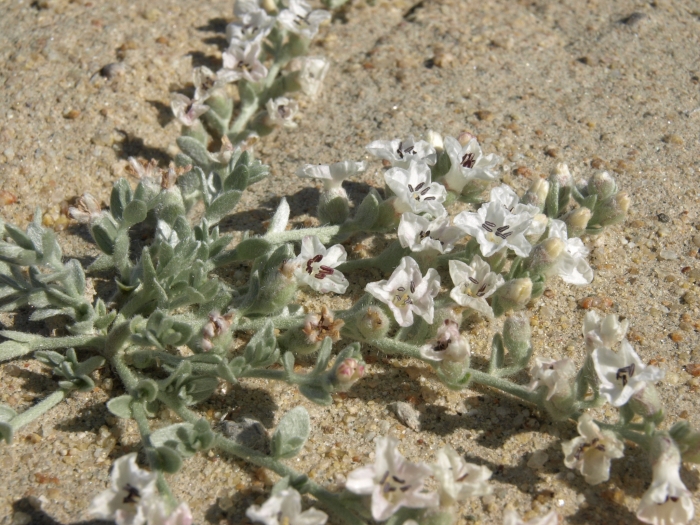Spreading Alkaliweed
(Cressa truxillensis)
Spreading Alkaliweed (Cressa truxillensis)
/
/

© Jim Morefield
CC BY 4.0
Image By:
© Jim Morefield
Recorded By:
Copyright:
CC BY 4.0
Copyright Notice:
Photo by: © Jim Morefield | License Type: CC BY 4.0 | License URL: http://creativecommons.org/licenses/by/4.0/ | Uploader: jdmore | Publisher: iNaturalist |

























Estimated Native Range
Summary
Cressa truxillensis, commonly known as spreading alkaliweed, is a perennial herb that is native to saline and alkaline environments, including coastal salt marshes, inland salt flats, and desert playas in the western United States, Mexico, and South America. It is well-adapted to extreme conditions found in these habitats, such as high salinity and aridity. The plant typically grows up to 10 inches tall with erect, branching stems that are densely covered with silky hairs. The small, hairy oval leaves are also adapted to conserve water. Spreading alkaliweed produces inconspicuous white flowers with five lobed corollas and hairy green sepals, which bloom in the axils of the uppermost leaves.
In cultivation, spreading alkaliweed is valued for its ability to thrive in harsh, saline environments, making it an excellent choice for xeriscaping and restoration projects in suitable climates. It requires minimal maintenance once established and can tolerate full sun and poor soil quality. It is often used to stabilize soils in areas affected by salinity. While not commonly found in ornamental gardens, it serves an important ecological role in its native habitat by providing ground cover that helps to reduce soil erosion. Gardeners interested in native plant landscaping or habitat restoration may find spreading alkaliweed a useful addition.CC BY-SA 4.0
In cultivation, spreading alkaliweed is valued for its ability to thrive in harsh, saline environments, making it an excellent choice for xeriscaping and restoration projects in suitable climates. It requires minimal maintenance once established and can tolerate full sun and poor soil quality. It is often used to stabilize soils in areas affected by salinity. While not commonly found in ornamental gardens, it serves an important ecological role in its native habitat by providing ground cover that helps to reduce soil erosion. Gardeners interested in native plant landscaping or habitat restoration may find spreading alkaliweed a useful addition.CC BY-SA 4.0
Plant Description
- Plant Type: Shrub, Herb
- Height: 0.75-0.8 feet
- Width: 0.25-1 feet
- Growth Rate: Moderate
- Flower Color: White
- Flowering Season: Spring, Summer, Fall
- Leaf Retention: Evergreen
Growth Requirements
- Sun: Full Sun, Part Shade
- Water: Medium
- Drainage: Medium, Slow
Common Uses
Drought Tolerant, Low Maintenance, Salt Tolerant
Natural Habitat
native to saline and alkaline environments, including coastal salt marshes, inland salt flats, and desert playas in the western United States, Mexico, and South America
Other Names
Common Names: Alkali Weed
Scientific Names: , Cressa truxillensis, Crescentia minima, Crescentia vallicola, Cressa arenaria, Cressa arenaria, Cressa australis var. petiolata, Cressa bulbispermum, Cressa cretica var. truxillensis, Cressa depressa
GBIF Accepted Name: